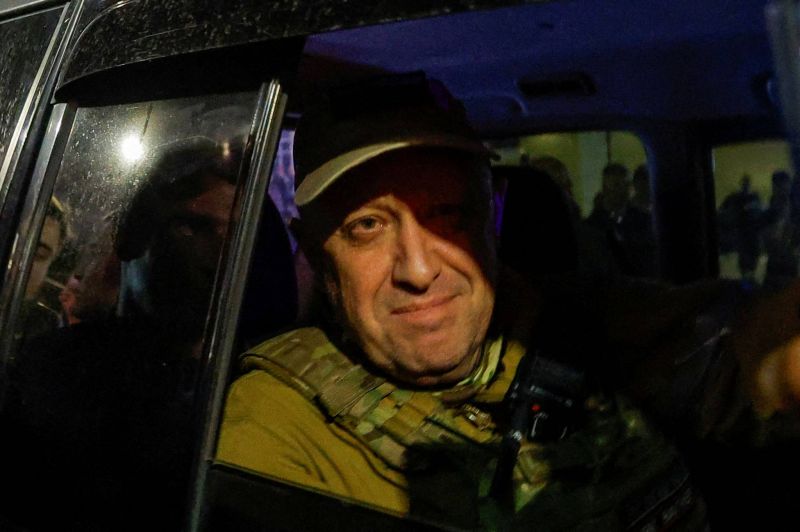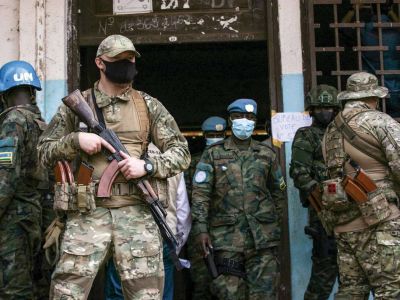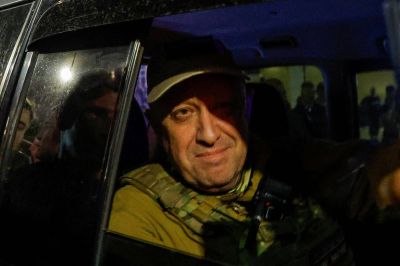
Wagner mercenary chief Yevgeny Prigozhin leaves the headquarters of the Southern Military District amid the group's pullout from the city of Rostov-on-Don, Russia, June 24, 2023. (Credit: Alexander Ermochenko/File Photo/Reuters)
Shortly after 6 p.m. Moscow time on Wednesday, a private plane crashed in the Tver region of Russia, killing all 10 people on board. Among the reported passengers was Yevgeny Prigozhin, the leader of the Wagner paramilitary group, who is presumed to be dead. The 62-year-old mercenary leader had close ties with Russian President Vladimir Putin before relations deteriorated in June 2023.
Earlier in the summer, Prigozhin spearheaded a swift mutiny against the Russian military command, which led the Russian President to label Prigozhin a traitor.
As of Thursday morning, the Kremlin had not yet confirmed Prigozhin's death. Meanwhile, political figures reacted to the news. "Putin doesn't forgive anyone," said Ukrainian presidential adviser Mykhaïlo Podoliak, commenting on the crash and seeming to imply that Prigozhin may have been eliminated by the Kremlin. US President Joe Biden said he was "not surprised" by the death of Wagner's boss. Prigozhin's death comes two months to the day after his short-lived rebellion against the Russian army, which saw thousands of mercenaries take up weapons and march from southern Russia towards Moscow with the aim of removing the country's military leaders.
His death raises many questions about the future of the paramilitary group, which has thousands of fighters and operates in several countries. Anna Borshchevskaya, a senior fellow in The Washington Institute focusing on Russia's policy toward the Middle East, answers questions from L'Orient-Le Jour.
1- What consequences will the death of Yevgeny Prigozhin have for Wagner? Additionally, who might succeed him in leading the group?
It’s unclear who might replace Prigozhin at the moment. He appears to have been a micromanager who also commanded loyalty from the core Wagner group. So if it is possible that the group would be unable to carry on in the short-term at least, it might be a big blow to the group. But that doesn’t mean that given more time, the Kremlin won’t find someone else.
2- What repercussions will the death of Prigozhin have on Wagner's operations, particularly those conducted in the Middle East?
It’s hard to imagine Wagner would simply leave entirely. In Syria, Wagner depended on the Russian Ministry of Defense for especially moving heavy equipment — from a logistics perspective, they still needed the Ministry of Defense in that regard. The question is: will there be less organization in their work, will they do their job less effectively, and so on.
3- In June, Prigozhin was behind a rebellion against Russia's conventional army. What does his death signify for the military and possibly political power in Russia?
From the very beginning, it was surprising that Putin had allowed Prigozhin to live after he carried out an attempted mutiny. This is highly unusual for a place like Russia. There are two possible reasons Prigozhin remained alive — he did not criticize Putin directly, and he must have been needed to carry out an essential function no one else could perform; it’s possible Putin couldn’t replace Wagner with another equally effective leader who would command the group’s loyalty. Now that he is dead, this would be a signal to others that they cannot pull a stunt like the one Prigozhin pulled and be allowed to get away with it.
The fact of the matter is, Putin has created a system of loyalty, a system where loyalty trumps competence, and he also traditionally pitted conflicting actors against each other in order to keep himself at the top of the power pyramid, and Prigozhin’s attempted munity highlighted the weakness of such a system. But if Prigozhin is killed it would send a signal to others that they should think twice before attempting another munity.

